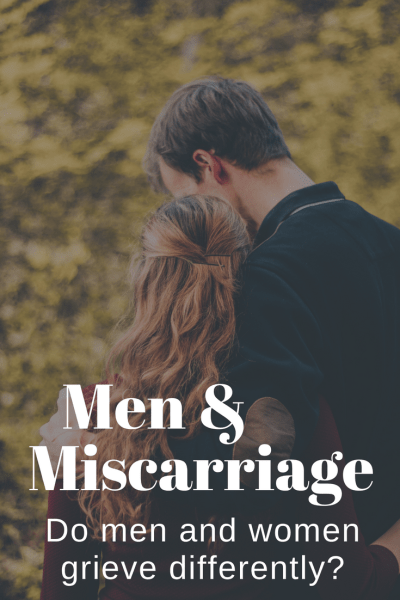
Welcome to the Men & Miscarriage Series where we’re exploring how miscarriage impacts men, listening to their stories, and finding ways we can support them in their grief. Miscarriage is not a “women’s issue”—it’s a family issue, a human issue. When we minimize miscarriage as a women’s issue only, we reinforce the notion that women are the only ones affected by this type of loss, which simply isn’t true. The Men and Miscarriage Series will feature contributions by both men and women. I’m especially excited to help set the stage to give space to the voices often unheard in conversations surrounding fertility and pregnancy loss: the voices of men—fathers and grandfathers who have lost and learned to give expression to their grief, and have learned to grieve with hope, despite what cultural norms surrounding masculinity have instructed them. Together may we discover ways to normalize this grief and find our way forward.
Please note: If you’d like to read further, you can also pick up a copy my book, Grace Like Scarlett: Grieving with Hope after Miscarriage and Loss, which includes a special section for dads written by my husband, Ryan.
Do men and women grieve differently after miscarriage and other types of pregnancy loss?
After we lost our first baby to miscarriage I had to learn how to grieve. It was all new to me—foreign, unfamiliar, clumsy. I knew miscarriage happened to people, but not us. We already had two children—why would things go wrong now? How could this possibly happen?
My sorrow in the earliest days was overwhelming. I wanted to find a cave and curl up and die there. Not because I actually wanted to die, but because I didn’t know how to live under the weight of my sadness.
Have you ever felt so filled with sorrow that it felt good to watch a sad movie just so you could get lost in a different pain and yet still cry your own? I had two songs during my earliest days of grief that provided this kind of outlet for me. Some days I would listen to them on repeat. Crying along with the lyric and melody somehow validated my pain, made me feel less alone. It was like a pressure value release and gave me a sense of permission to let it all out. (Needing permission is a fallacy by the way, but some of us need to be encouraged in this way. Music and art can help.)
One afternoon I asked my husband if he would listen to these two songs with me. I wanted him to experience what I was experiencing; I wanted to share our pain. He listened and when they were over I sat in quiet anticipation of the conversation that would follow, eager to discuss how our baby was being cared for in the safe presence of Jesus. Instead his head remained low, shoulders sunken, eyes fixed on his knees.
“Well?” I gently prodded, almost whispering. “Aren’t they beautiful?”
He shuffled a little. Sniffed. Wiped tears from his eyes.
“I don’t want Jesus to look after her.” His gaze still fixed downward. “I wanted us to look after her.”
And that’s all he said for a good, long while.
We would have many more conversations about our grief in the days to come, but in that moment he needed my presence more than he needed my words. He needed to know that I would sit in the silence and not try to explain the pain away. He needed to know that the shape of his grief was different than mine, and that was okay. He needed freedom to grieve his own way.
Although I knew on an intellectual level that both fathers and mothers grieve the loss of an unborn baby, this moment somehow made it real to me. We had cried together and held each other, but it was still so fresh that I found it hard to think beyond myself and my own grief. I was less curious about my husband’s grief in the way it affected him personally than I was in understanding how it related to us. This small exchanged helped. My perspective was widening. I was learning to better see his grief, too.
It was a few weeks post-miscarriage and we were learning to walk the slow pace through grief. We had survived the initial period of shock and trauma, which felt more like gasping for breath just to stay alive, and now the holy, gritty, regular work of grieving and processing what had happened was only just beginning.
Who is talking about the grief of miscarriage and pregnancy loss? Who is telling the stories?
Social media has changed the way we approach conversations around topics once considered taboo. This is purely anecdotal dotal, but it seems to me women are often leading these discussions and becoming more bold to speak up on matters long considered private or socially impolite. (Certainly concerning topics related to infertility and pregnancy and miscarriage, but other topics as well such as abuse, mental illness, the underside of parenting and relationships, and more.)
When I shared my first miscarriage with friends on social media and on my blog, I was astounded by the number of women who came forward to say me too and thank you. Even my own family members confessed having experienced miscarriages decades prior during a time when a woman was pregnant in church one week and quietly showed up unpregnant the next with no one uttering a word about it.
Social media has emboldened us to more freely share hard things. Women are talking and listening. We’re feeling beginning to feel validated. We’re normalizing one another’s experiences and starting to feel less alone.
But what about the men? Where are the men talking about this?
We can list all the stereotypes as reasons—men aren’t as emotional, men grieve differently, men aren’t as attached, and so forth—but it seems to me these stereotypes only serve to alienate them from a type of grief and pain that already feels alienating and abstract.
This is why I would suggest it’s just as unfair to say “men and women grieve differently” as it is to say “all women grieve the same.” These kinds of generalizations make us into caricatures and reduce us to a single story.* These unilateral statements minimize our experiences and reinforce unhealthy assumptions. They also do nothing to help us connect or heal.
Miscarriage is a not a women’s issue, it’s a human issue
We all grieve differently and respond to trauma differently, and—sure—our gender might factor into this because of cultural norms and expectations, but we’re not doing each other any favors by making miscarriage and pregnancy loss into a women’s issue. It’s a human issue—a family issue, a cultural issue, a religious issue, a health issue. In our current cultural climate, it’s even become a political issue.
Men grieve too. Men grapple with how to mourn the loss of a baby and a dream and a hope of a certain future. Like women, men enter into a complex grief. But unlike women, their grief can be exacerbated by the feeling of being “other” since they did not physically experience the pregnancy and loss the way the woman in their life did. They are finding their way through a changing cultural landscape just as much as we are, but perhaps with even less of a road map forward since they still aren’t talking about it as much as women are.
I remember my husband telling me that he wanted to talk about it more with his male friends but often wasn’t sure how to bring it into conversation. He was over forty years old and had never in his life heard a man talk about miscarriage. If it felt foreign to me, it felt other-worldly to him. This has changed now among our circle, but it started with Ryan initiating conversations when it was still uncomfortable.
So perhaps instead of saying “men grieve differently” in response to miscarriage and other types of pregnancy loss, it’s more accurate to say people grieve differently. And to remember that we need to give space for each person’s unique expression and process.
Grief fits no mold and follows no tidy blueprint—there are a thousand shades and a thousand paths, none of which are a surprise to God.
In closing:
For women:
What have you learned as you’ve watched the men in your life grieve after miscarriage? What do you wish you could do differently? Do you see miscarriage as purely a women’s issue? Why or why not?
For men:
What do you wish women knew about your grief after miscarriage or another type of pregnancy loss? What do you think about this idea that miscarriage is not “just” a women’s issue? Do you agree? Why or why not?
*If you have never listened to Chimamanda Ngozi Adichie’s TED Talk on The Danger of a Single Story, I urge you to take the time.
The Men & Miscarriage Series:
Do Men and Women Grieve Differently after Miscarriage and Pregnancy Loss?
How to Support the Man You Love after Miscarriage and Pregnancy Loss
Lima Beans and Hope in the Freezer Aisle: Miscarriage through the Eyes of a Grandfather
Marriage, Sex, and Intimacy after Miscarriage
From Man to Man after Miscarriage: Honest Talk about Marriage and Loss
(Find the whole series here: Men & Miscarriage Series.)
Additional resources:
Miscarriage Stories and Resource page
How to Support a Friend after Miscarriage and Loss
What Not to Say to a Friend after Miscarriage (And What to Say Instead)
How to Grieve with Hope Devotional—A free 7-day devotional on YouVersion Bible app based on Grace Like Scarlett
Book: Grace Like Scarlett: Grieving with Hope after Miscarriage and Loss by Adriel Booker
Pin for later reference:

Featured images by Edward Cisneros and Almos Bechtold on Unsplash.



1 Comment
Kathleen Turner
26 June 2018 at 4:27 pmIt’s very difficult for some women to get pregnant, and unfortunately I am one of them. My irregular periods make it difficult for me to know about my fertility days. Ovulation calculator has done a great job in solving my problem. By using this calculator I figured out my fertility days and right after I got pregnant. I will consider it a life saver. Getting pregnant is the most precious moments in women’s life and I am enjoying those moments just with the help of ovulation calculator.